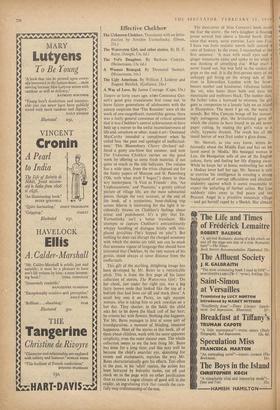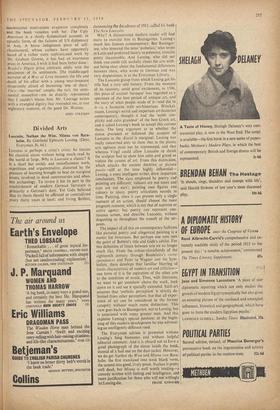Effective Chekhov
The Vet's Daughter. By Barbara Comyns. (Heinemann, 13s, 6d.) A Woman Besieged. By Desmond Stewart. (Heinemann, 16s.) A Way of Love. By James Courage. (Cape, 15s.) THIRTY or forty years ago, when Constance Gar- nett's good grey translations first came out, to leave future generations of adolescents with the uneasy suspicion that `The Russians' were all the work of one magnificent, monolithic genius, there was a fairly general consensus of critical opinion that it was Chekhov's central achievement to have held up a mirror to the awful inconclusiveness of life and, somehow or other, made it art : Desmond MacCarthy intended a compliment when he called him `the poet and apologist of ineffectual- ness.' This Bloomsbury Cherry Orchard suf- fered a gusty axe-blow last summer, and now The Unknown Chekhov carries on the good work by offering us some fresh material, if not quite so much as the title indicates. The volume has a wide span, from the trivia churned out for the funny papers of Moscow and St. Petersburg (`0h, with what trash I began!') down to that wry masterpiece, 'A Visit to Friends' : this, `An Unpleasantness,' and 'Peasants,' a grimly critical picture of village life, are the most substantial pieces, though the racy account, at the end of the book, of a mysterious, bone-shaking trip across Siberia is interesting for the light it in- cidentally throws on Chekhov's feelings about crime and punishment. It's a pity that Dr. Yarmolinsky isn't a better translator. His attempts to capture Chekhov's extraordinarily whippy handling of dialogue bristle with mis- placed jovialities (`he's hipped on you!'). But nothing he does can disrupt the charged economy with which the stories are told; nor can he mask that sensuous vigour of language.that should have intimated that Chekhov, by the very nature of his genius, stood always at some distance from the ineffectuals.
This gift of the startling, delighting image has been developed by Mr. Bates to a remarkable pitch. This is from the first page of his latest collection of stories, The Watercress Girl: 'On her cheek, just under her right eye, was a big furry brown mole that looked like the top of a bulrush that had been cut off and stuck there.' A small boy sees it on Pacey, an ugly myopic woman, who is taking him to pick cowslips on a hot day. They chatter; in the fields the child asks her to let down the black coil of her hair; he crowns her with flowers. Nothing else happens. Yet Mr. Bates manages to hint at some sort of transfiguration, a moment of blinding, innocent happiness. Most of the stories in this book, all of them about children, work with the same apparent simplicity, even the more sinister ones. The whole collection seems to me the best thing Mr. Bates has done for a long time; and this may well be because the child's anarchic eye, skimming for sweets and excitements, matches the way Mr. Bates characteristically gets his effects. Too often in the past, in his 'adult' stories, the action has been betrayed by bulrushy moles, cut off and stuck on to the page with no other justification than to create a vague climate of good will in the reader, an ingratiating trick that cancels the care- fully easy craftsmanship of the rest. The dust-cover of Miss Comyns's book made me fear the worst : the vet's daughter is floating prone several feet above a blasted heath. Ever since that weary, nasty exercise, Lady into Fox, I have run from realistic novels built around a core of fantasy. In the event, I succumbed at the first sentence: 'A man with small eyes and 3 ginger moustache came and spoke to me when I was thinking of something else.' What else? I never found out, but was held in the coolest of grips to the end. It is the first-person story of an unhappy girl living on the wrong side of the river in Edwardian London with her brow- beaten mother and handsome, villainous father, the vet, who hates them both and dyes his moustache and eyebrows black. The mother dies, the father takes a barmaid to mistress, the girl goes as companion to a lunatic lady on an island in Hampshire. The more I go on, the worse it sounds. But Miss Comyns brings off her increas- ingly outrageous plot, the levitational germ of which she claims to have found in an old news- paper cutting, by muting the girl's voice to a chilly, hypnotic dryness. The result has all the tinted horror of wax fruit under a glass dome.
Mr. Stewart, as you may know, writes in- formedly about the Middle East and has set his latest novel in 'Media.' His besieged woman is Lisa, the Hungarian wife of one of the English colony, forty and feeling her life slipping away. While he keeps her at home, embroiling her with a Median lover half her age, Mr. Stewart is able to exercise his intelligence in creating a strong background of corrupt officialdom and idealistic studentry against which it seems reasonable to expect the unfurling of further action. But Lisa suddenly rides away to find peace and the Peacock Angel in a primitive mountain village —and get herself raped by a Sheikh. Her already
insubstantial motivations evaporate completely and the book vanishes with her. 7'he Ugly American is a thinly fictionalised account, in episodic form, of the failures of US diplomacy in Asia. A brave indigenous piece of self- chastisement, whose authors have apparently heard of a rather more sophisticated work by M r. Graham Greene, it has had an enormous press in America. I wish it had been better done : Reader's Digest prose contrasts oddly with the pessimism of its sentiments. The middle-aged narrator of A Way of Love recounts the life and death of his affair with a young near-innocent desperately afraid of becoming -one of them.' They—the 'married' couple, the tart, the senti- mental masochist—are so drearily represented that I couldn't blame him. Mr. Courage writes with a strangled dignity that reminded me, at one nightmare moment, of the good Dr. Watson.
JOHN COLEMAN







































 Previous page
Previous page